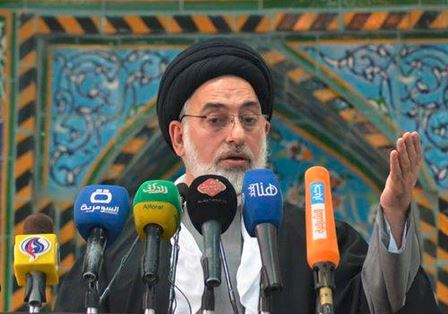
RNA – During his Friday prayer sermon delivered to a large and fervent crowd of believers in the Iraqi city of Najaf, Hujjat al-Islam Sayyid Sadruddin al-Qubanchi referred to the “historic” offensive to recapture Mosul from Takfiri ISIL terrorists, saying the beginning of the liberation of Iraqi’s second-largest city and the governorate of Nineveh will be the end of ISIL in Iraq.
“We hope that this happens quickly. The liberation of seven villages and the raising the Iraqi flag over the Faculty of Arts [of the University of Mosul] reflects the reality of this operation,” he added.
The operation entitled “Operation Fatah (Conquest)" launched on Thursday.
The Iraqi cleric added that the presence of scholars and clerics in the war against ISIL terrorists is commendable and noted that the Islamic Seminary has offered many martyrs in this war.
Hujjat al-Islam al-Qubanchi also emphasized the need for immediate implementation of reform in Iraq and added that this reform program should be based on the constitution and in accordance with the opinion of the nation. “There should be solidarity between the executive and legislative branches of government and the various parties should not attack each other,” he said.
“Despite problems and birth pangs,” he noted “the process of positive political reforms in the country has advanced” as there is a good program for reform and everyone seeks real reform.
Brussels terrorist attack warning to Western countries
In regard to global events, the renowned teacher in the Islamic Seminary of Najaf condemned last Tuesday’s terrorist attacks in the Belgian capital, saying: “Despite the hostile and brutal terrorist attacks against innocent people in Brussels, this was a warning to the [Western] countries which have created and are nurturing terrorism and [Takfiri] groups, such as ISIL, the al-Nusrah Front and their allies.”
Hujjat al-Islam al-Qubanchi stressed that Western countries should be serious in fighting and uprooting terrorism, both in the region and around the world, and should refrain from political engagement with political terrorists and the Takfiri phenomenon.
111/112